In this article:
Skin allergies are a common health issue faced by many people around the world, affecting both children and adults.

A skin allergy happens when the immune system reacts abnormally to a substance, resulting in various symptoms such as itchiness, erythema (redness), edema (swelling), and blisters. Skin allergies can be due to genetics, environmental factors, and lifestyle factors.
In India, traditional medicine has been used for hundreds of years to deal with different ailments, and one of them is skin allergies. (1)(2)
This article aims to explore some of the Indian home remedies used for treating skin allergies.
What Are Some Indian Home Remedies for Skin Allergies
While various over-the-counter medications are available to treat skin allergies, many people turn to traditional remedies that have been used for centuries to treat various skin conditions.
Here are some home remedies famous in India that can help relieve skin allergies.
1. Apply neem paste to the affected areas
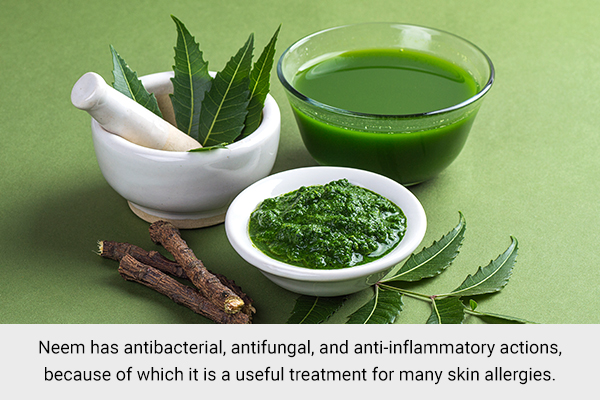
Neem (Azadirachta indica) is a tree native to India and has been used for therapeutic reasons for centuries.
Neem has antibacterial, antifungal, and anti-inflammatory actions, because of which it is a useful treatment for many skin allergies. Neem can be used in various forms such as leaves, oil, and powder. (3)(4)(5)
How to use neem for skin allergies:
- Neem leaves can be mashed to make a paste, which can be used on the affected area to reduce itching and inflammation.
- Neem oil can be mixed with coconut oil and applied to the skin to comfort and moisturize the skin.
- Neem powder can be added to honey to make a paste, which can be applied to the affected area for 15–20 minutes and then rinsed off with water.
2. Use turmeric powder on the affected areas
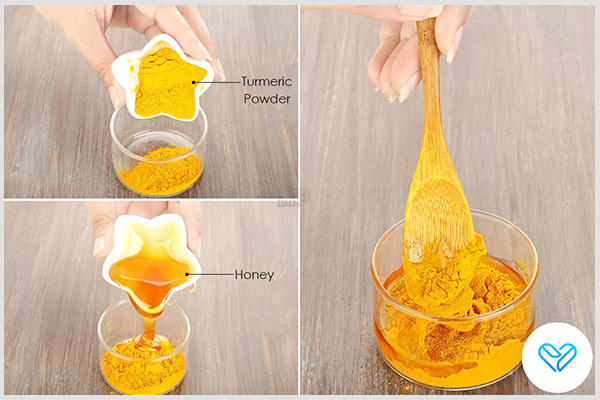
Turmeric (Curcuma longa) is a spice famously used in Indian cuisine and has been a part of Ayurvedic medicine for years.
The active component in turmeric is curcumin, which has been shown to have powerful anti-inflammatory and antioxidant activities, which make it an effective remedy for various skin allergies.
A study found that curcumin was able to modulate the immune response in allergic individuals, leading to a reduction in symptoms.
Specifically, curcumin was found to inhibit the production of histamine, (6) which is a compound that is released by mast cells in response to an allergen. It causes symptoms such as itchiness, edema, and redness.
By inhibiting histamine production, curcumin can help to decrease the severity of these symptoms. (6)(7)
Turmeric can be used in various forms such as turmeric powder, turmeric paste, and turmeric oil.
How to use turmeric for skin allergies:
- Turmeric powder can be mixed with honey and applied to the affected area to ameliorate inflammation and itching.
- Turmeric powder can be mixed with water or milk and applied to the affected area for 15–20 minutes and then rinsed off.
- Turmeric oil can be added to coconut oil and used on the skin for symptomatic relief and moisturization.
3. Apply aloe vera gel to the affected region
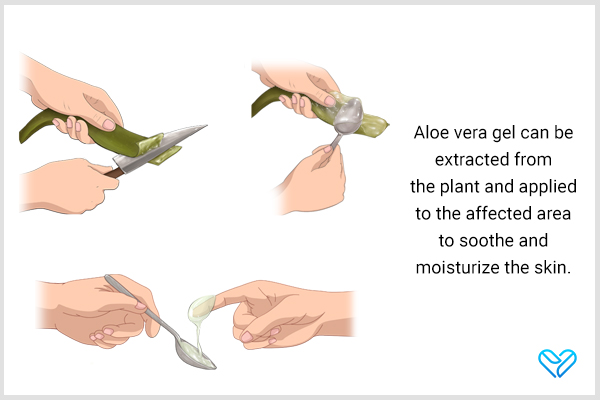
Aloe vera is a plant with thick fleshy tissues adapted to water storage and has been used for medicinal purposes for centuries. Aloe vera has anti-inflammatory and moisturizing activities, which make it a useful treatment for different kinds of skin allergies.
A study found that aloe vera was able to reduce the symptoms of allergic rhinitis in rats by inhibiting the release of allergy-causing chemicals in the body and reducing inflammation in the nasal mucosa. (8)(9)
How to use aloe vera for skin allergies:
Aloe vera gel can be extracted from the plant and applied to the affected area to soothe and moisturize the skin.
4. Apply sandalwood powder to the affected areas
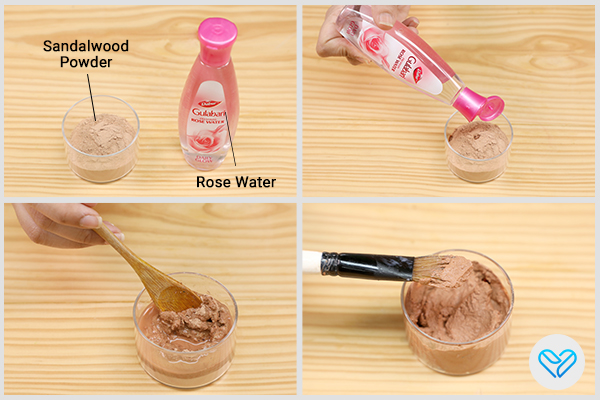
Sandalwood (Santalum album) is a tree native to India and has been used for medicinal purposes for centuries. Sandalwood has anti-inflammatory and cooling activities, which make it a good treatment for many types of skin allergies.
A study found that East Indian sandalwood oil (EISO) is a potent inhibitor of an enzyme that breaks down a signaling molecule that plays an important role in regulating the immune response. By hampering its function, EISO reduces inflammation and suppresses the functioning of immune cells that cause allergic responses. (10)(11)
How to use sandalwood for skin allergies:
Sandalwood powder can be mixed with rose water or milk to make a paste, which can be applied to the affected area for 15–20 minutes and then washed off with water.
5. Apply basil powder to the affected areas
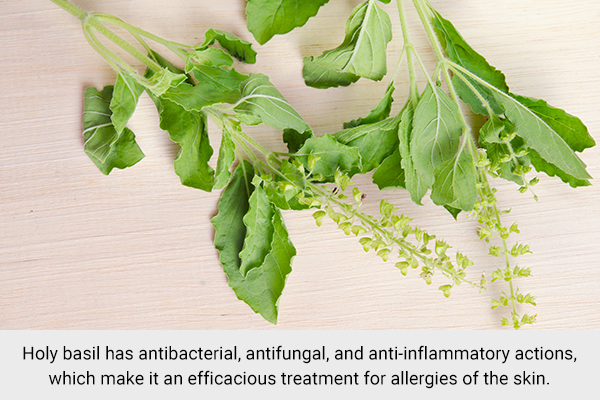
Holy basil (Ocimum tenuiflorum) is an herb commonly used in Indian cuisine and has been used in Ayurvedic medicine for centuries. Holy basil has antibacterial, antifungal, and anti-inflammatory actions, which make it an efficacious treatment for allergies of the skin. (12)
How to use basil for skin allergies:
Holy basil leaves can be mashed to make a paste, which can be used on the affected area to reduce inflammation and itching.
6. Use coconut oil on the affected areas
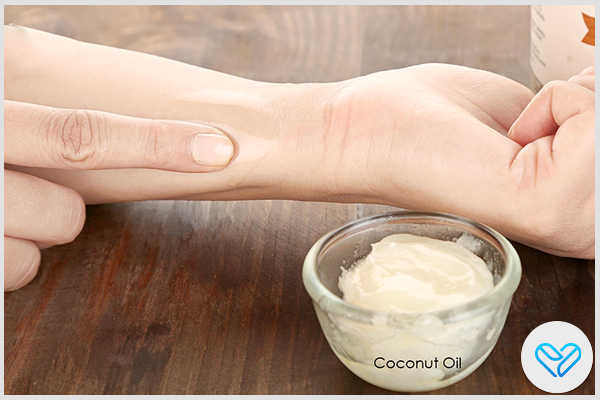
Coconut oil is a versatile oil generally used in Indian cuisine and has been known for its therapeutic abilities for centuries. Coconut oil has anti-inflammatory and moisturizing activities, which make it a useful treatment for skin allergies.
A recent study published found that dietary coconut oil can ameliorate skin contact hypersensitivity (CHS) in mice through the production of mead acid. (13)
The study found that mead acid, a monounsaturated fatty acid produced by the metabolism of lauric acid found in coconut oil, plays a key role in reducing inflammation and preventing allergic reactions in the skin.
The researchers fed the mice a diet rich in coconut oil and found that it significantly reduced the severity of CHS, a type of allergic reaction that occurs when the skin is exposed to an allergen. (13)
How to use coconut oil for skin allergies:
Coconut oil can be applied straight to the affected region to soothe and moisturize the skin.
7. Apply chamomile tea to the affected areas
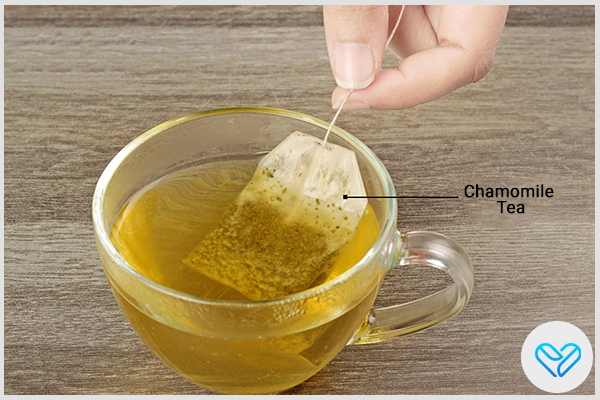
Chamomile (Matricaria chamomilla) is an herb typically used in Ayurvedic medicine. Chamomile has anti-inflammatory and soothing abilities, which make it an efficacious remedy for skin allergies. (14)
How to use chamomile tea for skin allergies:
Chamomile tea can be brewed and applied to the affected area with a cotton ball to reduce itching and inflammation.
When to See a Doctor
While Indian home remedies may be effective for treating certain types of skin allergies, it is important to seek medical treatment if your symptoms are serious or persistent.
A dermatologist can help analyze the underlying reason for your skin allergy and deliver appropriate treatment, which may include prescription drugs and other medical interventions.
Most-Asked Questions About Skin Allergies
Are Indian home remedies effective for the treatment of skin allergies?
Indian home remedies can be effective in treating certain types of skin allergies, but it is crucial to talk with a dermatologist to identify an adequate course of therapy for your skin condition.
Some home remedies, such as turmeric and neem, have been shown to have anti-inflammatory and antimicrobial properties that may help reduce symptoms of skin allergies.
Are there side effects linked with the use of Indian home remedies for skin allergies?
While many Indian home remedies are generally safe to use, it is important to be aware of the potential risks and side effects associated with each remedy. Some remedies may result in irritation of the skin or allergic responses in some individuals.
Additionally, it is important to use any home remedy as directed and to avoid overuse, as excessive use could lead to further skin irritation or damage.
Can Indian home remedies be used with medical treatments for skin allergies?
In some cases, Indian home remedies may be used in conjunction with medical treatments for skin allergies to help alleviate symptoms and promote healing.
However, it is important to consult with a dermatologist before using any home remedy alongside medical treatment, as some remedies may interact with certain medications or cause adverse reactions.
Final Word
Skin allergies can be a challenging health issue to deal with, but with the help of traditional Indian remedies, they can be effectively managed.
Neem, turmeric, aloe vera, sandalwood, holy basil, coconut oil, and chamomile are some of the Indian home remedies that have been used for centuries to treat various skin allergies.
These remedies have anti-inflammatory, antibacterial, and antifungal properties, which make them effective in reducing itching, inflammation, and other symptoms of skin allergies.
- Was this article helpful?
- YES, THANKS!NOT REALLY


